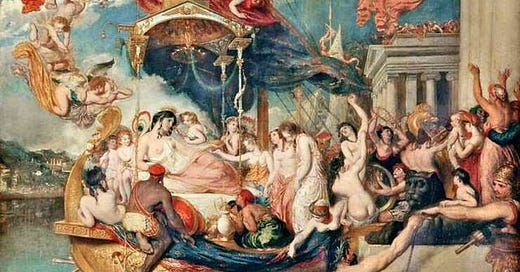'A most triumphant lady': the unforgettable entrance of a queen
William Shakespeare, Antony and Cleopatra
This famous speech describes Cleopatra, Queen of Egypt, sailing on her golden barge up the River Cydnus.
Now read on:
The barge she sat in like a burnished throne
Burned on the water. The poop was beaten gold,
Purple the sails, and so perfumed that
The winds were lovesick with them. The oars were
silver,
Which to the tune of flutes kept stroke, and made
The water which they beat to follow faster,
As amorous of their strokes. For her own person,
It beggared all description: she did lie
In her pavilion—cloth-of-gold, of tissue—
O’erpicturing that Venus where we see
The fancy outwork nature. On each side her
Stood pretty dimpled boys, like smiling Cupids,
With divers-colored fans, whose wind did seem
To glow the delicate cheeks which they did cool,
And what they undid did.
Her gentlewomen, like the Nereides,
So many mermaids, tended her i’ th’ eyes,
And made their bends adornings. At the helm
A seeming mermaid steers. The silken tackle
Swell with the touches of those flower-soft hands
That yarely frame the office. From the barge
A strange invisible perfume hits the sense
Of the adjacent wharfs. The city cast
Her people out upon her; and Antony,
Enthroned i’ th’ market-place, did sit alone,
Whistling to th’ air, which but for vacancy
Had gone to gaze on Cleopatra too
And made a gap in nature.
What we love about this passage...
It doesn't get much grander than this.
The arrival of Cleopatra is so glorious, and the barge she sits in so sumptuously decorated and perfumed, that even the air would leave the city to go and watch her sailing in (though that would leave a 'gap' in nature by depriving a lot of citizens of oxygen!).
We love the fact that Shakespeare doesn't show us the arrival itself but uses language alone to paint the scene. It's so vivid and so lavish that you can almost smell the perfume and see the gold. This purely descriptive moment rivets the audience's attention on the unfolding imagery: a moment of stillness and inaction, yet full of sensory richness and excitement.
About the author
William Shakespeare (1564-1616) was the author of at least 27 plays, including Hamlet, Macbeth, Richard III, Romeo and Juliet, A Midsummer Night’s Dream, Much Ado about Nothing, As You Like It, Othello, Henry IV parts 1 and 2, and The Tempest.
To read alongside...
T.S. Eliot opens 'The Game of Chess' section of his 1922 poem The Waste Land: 'The chair she sat in, like a burnished throne'. Cleopatra's 'throne' has become just a 'chair', and the woman in Eliot's poem is no queen but a neurotic person dealing with the aftermath of World War I. (It's 100 years since the publication of The Waste Land--another reason to raise a glass!)
Carol Ann Duffy likewise punctures the elevated speech of Shakespeare's description. In her long poem The Feminine Gospels, Duffy's Cleopatra 'sashayed up the river/In a golden barge/Her fit girls giggling at her jokes.'
Tom Stoppard's 1993 play Arcadia features a pupil laboriously translating this famous speech from the Latin into which her far-too-clever tutor has mischievously set it as a trick on her. The trick is on him, though: she is so brilliant that she unwittingly translates it exactly as Shakespeare wrote it.
We chose Shakespeare for this Jubilee edition of our newsletter because he is intimately connected to the English monarchy and to Queen Elizabeth I in particular through his service as a playwright and actor during her reign. Also, his birthday is 23 April, the same day as the quintessentially English 'St George's Day' and two days after Queen Elizabeth II's birthday. Celebrations all around!
Suggest a LitHit!
Tell us your own favourites from literature you've read, and we can feature you as a Guest Curator. Just email us with the following information:
Your full name
The title of the book you're suggesting
The location of the excerpt within the book (e.g., "in the middle of chapter 5"), or the excerpt itself copied into the email or attached to it (in Word)
Why you love it, in just a few sentences
**Please note that we welcome all suggestions but at the moment we can only release excerpts that are out of copyright and in the public domain. This means 75 years or more since the author's death. You can find many such out-of-copyright texts on the internet, for example at Project Gutenberg and Standard Ebooks.
About LitHits
You might also enjoy...
Writers Make Worlds: https://writersmakeworlds.com/
The Ten Minute Book Club: https://www.english.ox.ac.uk/ten-minute-book-club
Project Gutenberg: https://www.gutenberg.org/
Standard Ebooks: https://standardebooks.org/
“Five Tips to Get Reading Again if You’ve Struggled During the Pandemic,” The Conversation (8 January 2021): https://theconversation.com/five-tips-to-get-reading-again-if-youve-struggled-during-the-pandemic-152904
Feedback
We'd love to hear your thoughts on our newsletter:
kirsten@lit-hits.co.uk
Graphic design by Sara Azmy
All curation content © 2022 LitHits. All rights reserved.




